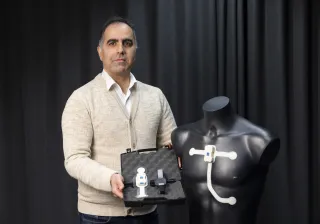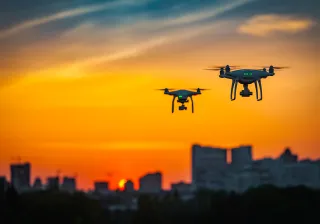Cyber-physical systems (CPS) combine physical device with a digital service system. For example, energy, building and traffic systems typically target to operate in this smart way. However, high level trust, reliability and security is required while facing the rise of cyber-threats. VTT and its partners have created solutions for enhancing digital trust in such cyber-physical systems.
New cyber-physical systems could lead to a variety of innovations in different fields of business. The CPS are already in common use in some application areas, such as industrial automation. However, a lack of digital trust has prevented their establishment in critical systems involving multiple actors. Challenges include the smart use of exposed data and devices, the management of communities and the control of access rights, among others.
The recently finished TIoCPS project, coordinated by VTT, aimed to solve these issues. It achieved a set of key enablers for enhancing digital trust – new solutions for offline data sharing, offline authentication, access control, energy community applications, trust infrastructure and AI-based optimisation.
“These key enablers have been successfully demonstrated in use-cases related to energy, buildings and mobility, and they can facilitate new products and services in a wide range of domains. The project has helped to lay the technical foundation for the concept of smart, trustworthy communities for CPS”, says the head of the research project, Juhani Latvakoski, Principal Scientist at VTT.
Improved access control
One example of the key enablers is a new solution for access control delegation. Bittium has developed a proxy server technology with access delegation tokens for new use-cases, such as temporary access to buildings for maintenance workers.
“In this project we contributed to a scenario, where a tenant can delegate access to building automation to a service person. Bittium has applied the results to implement a system that allows customers to delegate fine-grained access to mobile device network analytics. This innovation is an enhancement to the Bittium SafeMove® Device and Security Management System, focusing on cryptographic access tokens and granular access delegation to the application programming interfaces (APIs) of diverse systems. Importantly, it enables access control to be managed out-of-band, eliminating the need for user account databases that store personal information, thereby addressing privacy concerns. This approach simplifies cross-organizational API access management without compromising user privacy”, says Anton Gyllenberg, Senior Product Manager at Bittium.

Smarter use of energy systems
Enerim has developed an energy aggregation platform to enable third-party integrations. This platform can combine the flexibility potentials of the energy-sensitive resources of multiple buildings and trade them on the energy flexibility markets.
The platform helps to control the energy consumption and production elements of buildings automatically, according to energy market price forecasts. At the same time, the requirements of the end-users, system operator, and balance responsible party can be considered. This allows developing new flexible products for energy and optimising electricity distribution as well as improving its reliability in electricity systems of the future.
“Our main focus was on energy flexibility aggregation for both energy communities and individual buildings. Solutions harnessing the flexibility potential in the energy market have been developed. Trust and interoperability across common data spaces serve as critical enablers for Enerim’s future business opportunities within the energy industry value chain”, says Janne Huvilinna, Project Manager at Enerim Oy.
Elvak participated in this development, bringing flexibility potential from a building to the energy market.
”During the project, we have gained in-depth insight about the technical requirements of a brand-independent service platform and issues affecting data management, such as data format, security, access rights or presentation. We have acquired this information through research, piloting and prototyping. The expertise is mainly related to the processing of different technical interfaces and data, as well as information security. In addition, we have learned about the management and limited sharing of user rights in different practical situations”, says Kari Kokko, Sales Director at Elvak.
Better hunting safety
The outcomes of the project also include CPS solutions to prevent hunting accidents, developed together with Tracker and Polar. Hunting safety could be improved, and accidents prevented by increasing exchange of information between devices carried by the people. This is enabled through the application of long-range Bluetooth Low Energy (BLE) to exchange presence and location information between devices.
“We develop products and services connected with hunting in which human safety is the priority. Developing information exchange methods between products can prevent hunting accidents, thereby saving human lives”, says Hannu Lohi, Head of Research and Innovation at Natlink Oy, which does development and owns the Tracker brand.

“The project has yielded significant technological advancements, culminating in the development of a security-driven radio and data architectures for devices. This innovation empowers the secure sharing of biometric and personal information with third-party ecosystems. The results and findings obtained through our research are crucial for identifying vulnerabilities and proactively mitigating emerging security threats. By implementing the proposed security measures, we aim to fortify the integrity of data communication and ensure a robust defense against potential risks", says Jari Miettinen, ESW Line & IPR Manager at Polar.
TIoCPS (The Trustworthy and Smart Communities of Cyber-Physical Systems) was an international research project coordinated by VTT aimed to develop innovative solutions for cyber-physical systems requiring digital trust. Finnish participants also included Polar Electro Oy, Bittium Oyj, Tracker Oy, Elvak Oy, Optima Oy, and Enerim Oy. The project was made possible by Eureka ITEA and national funding organisations from Portugal, Belgium, and Turkey. In Finland, the project was funded by Business Finland. A total of 15 partners took part in the ITEA project, which opened significant new opportunities for cooperation for Finnish companies.






